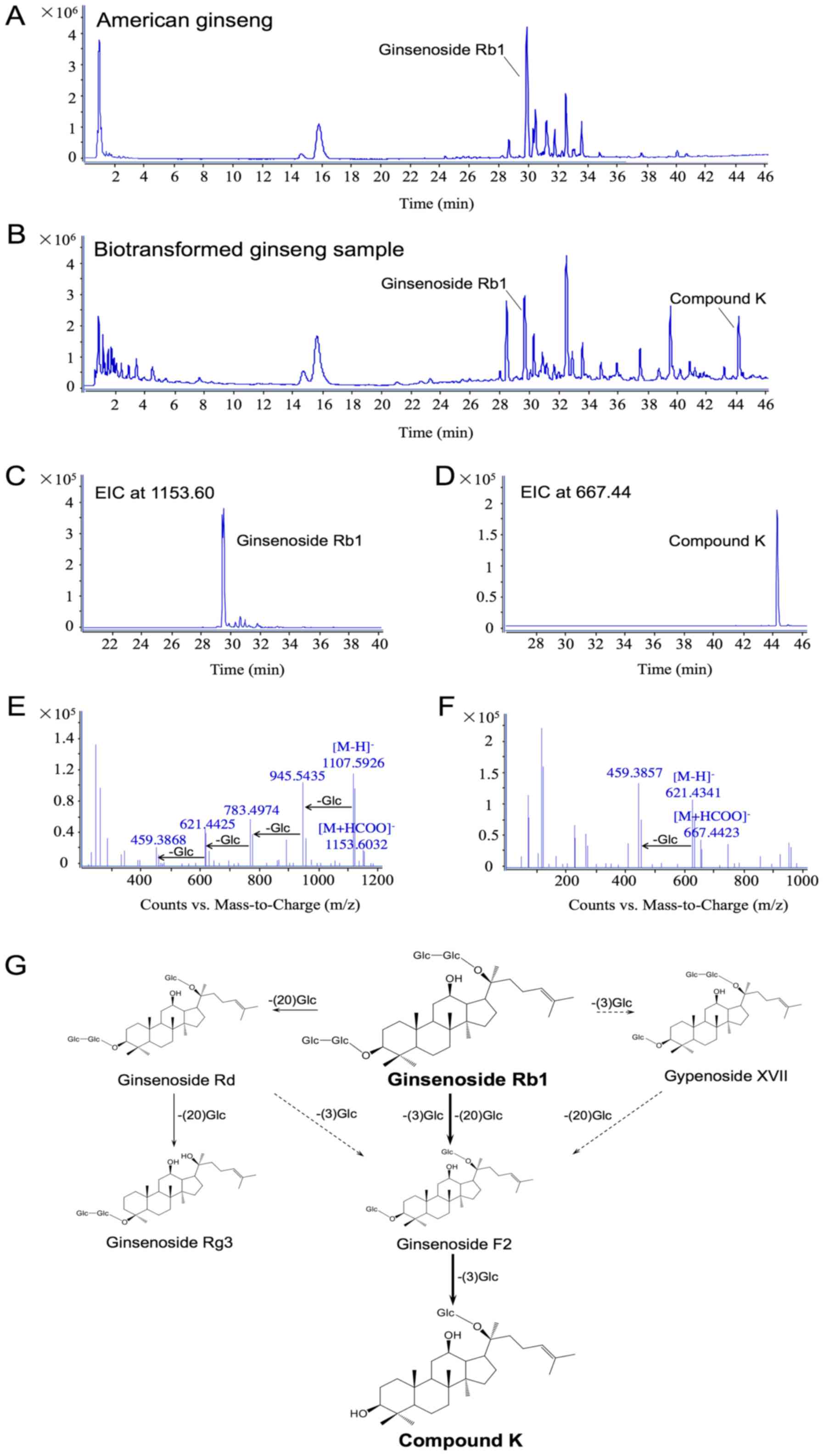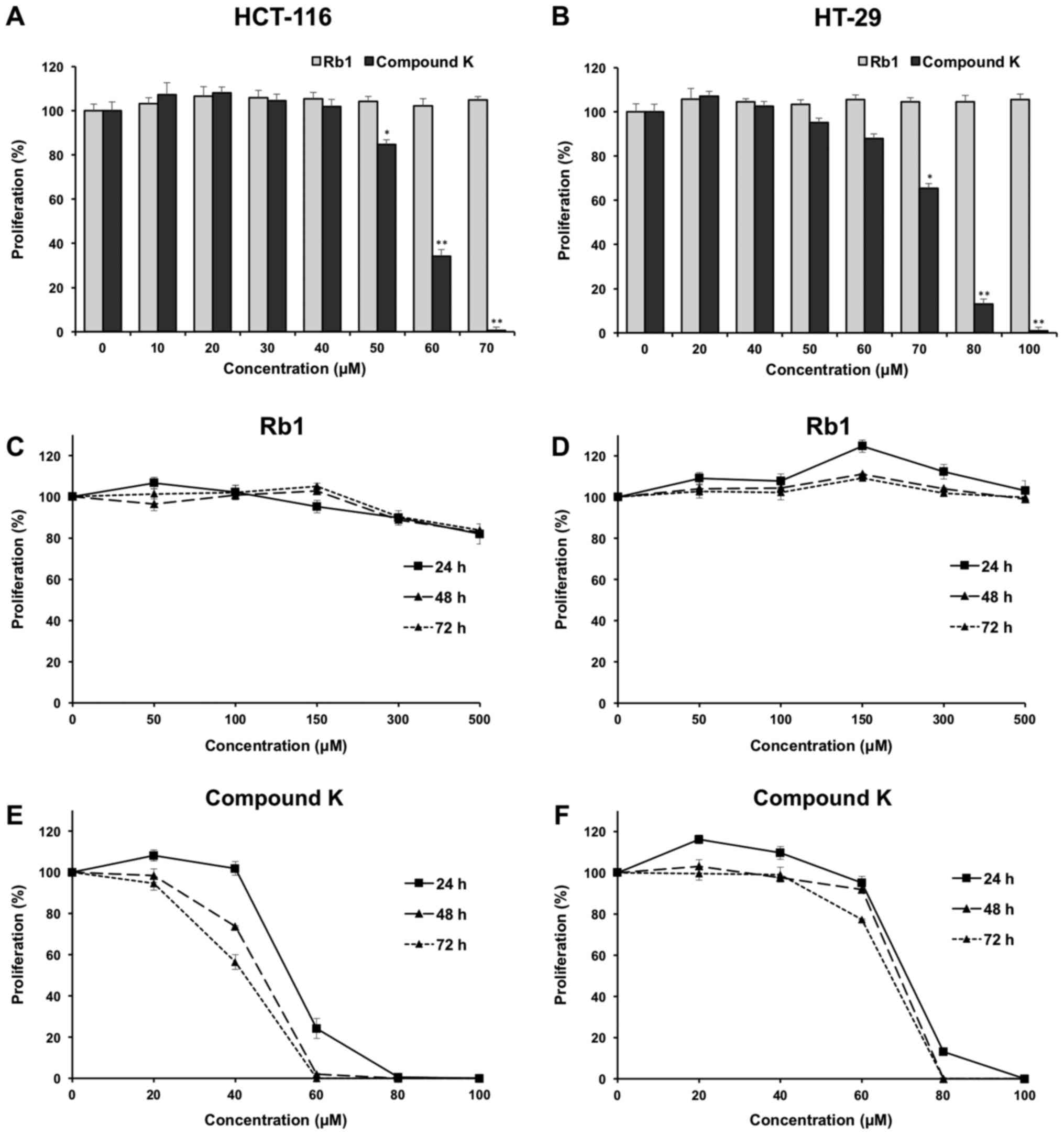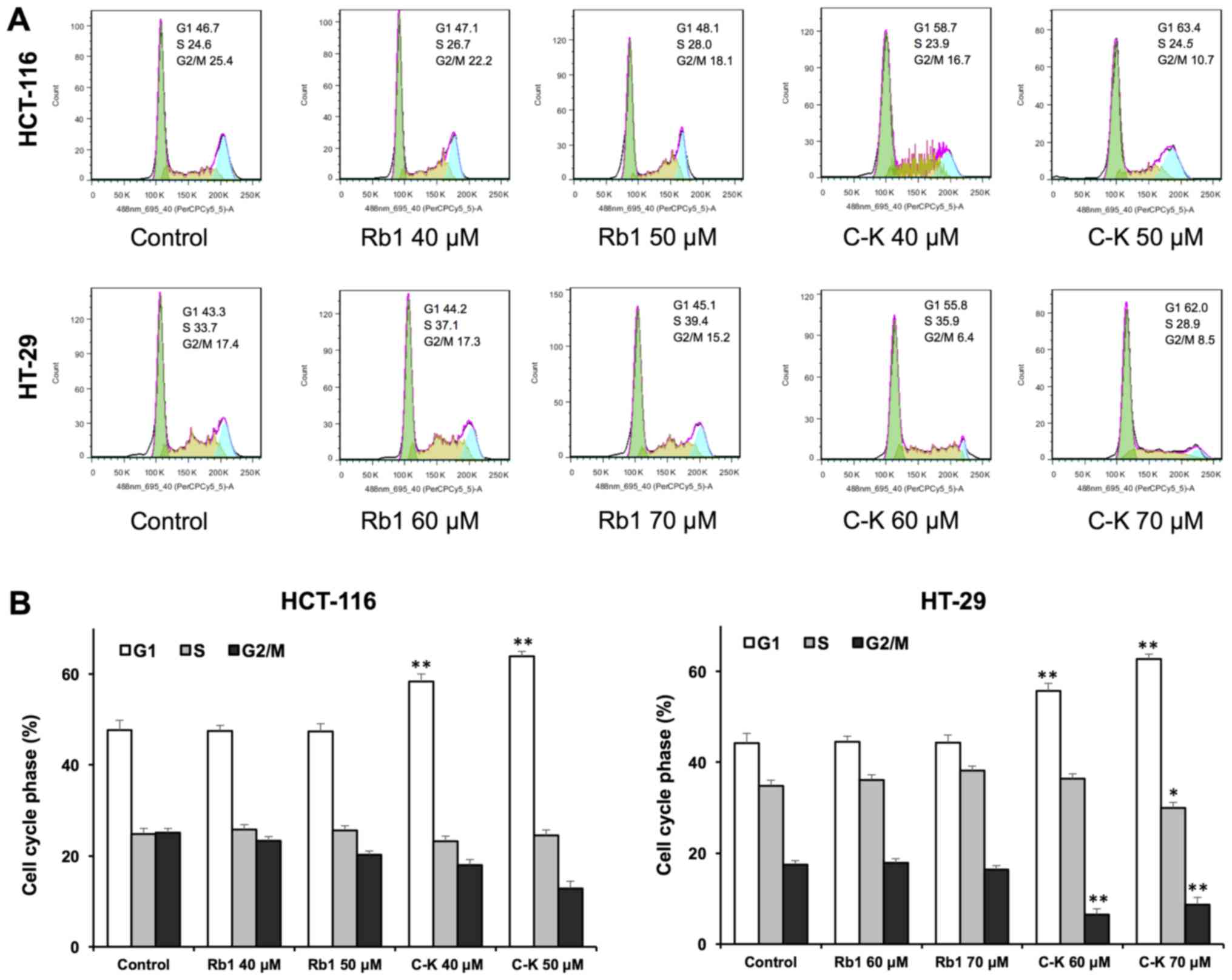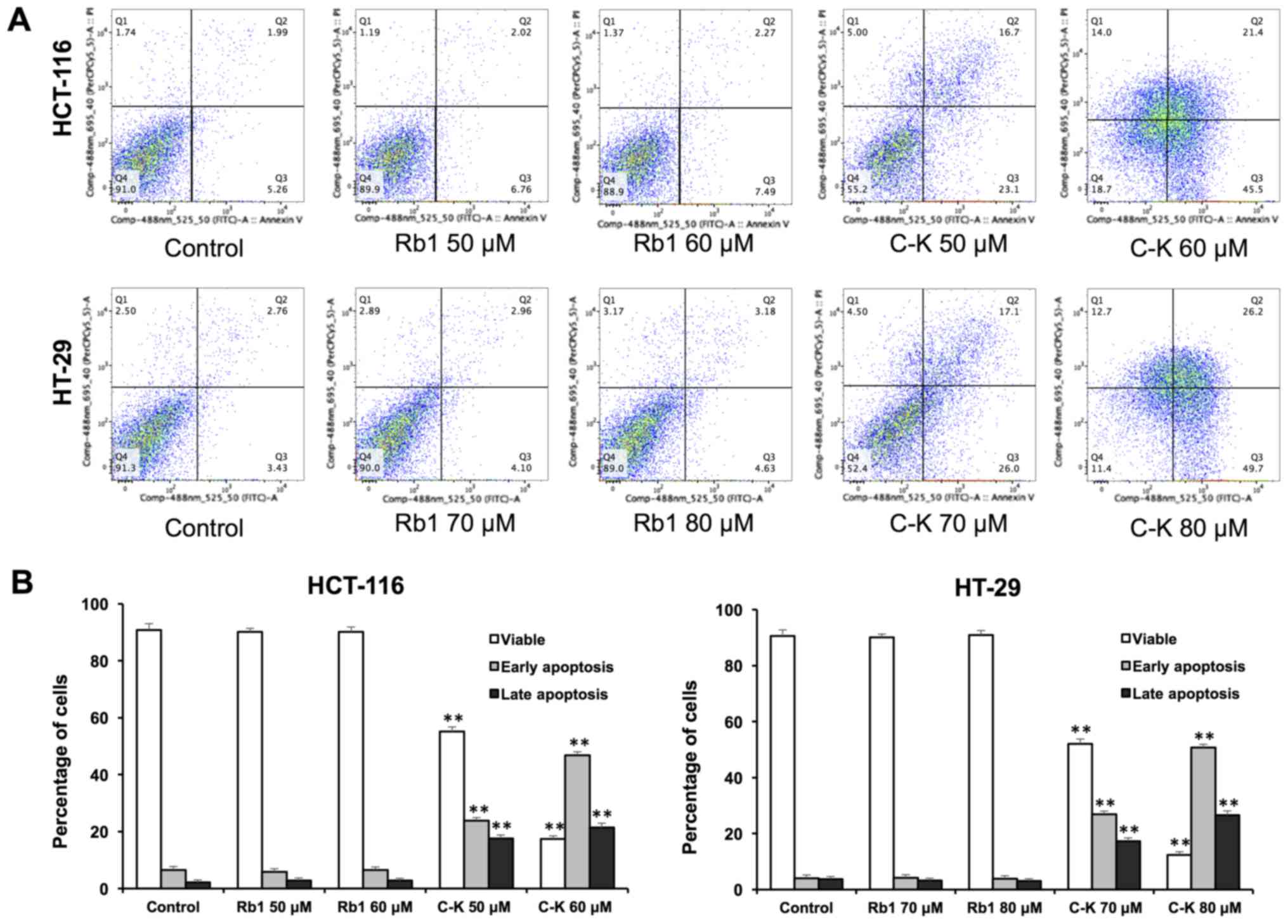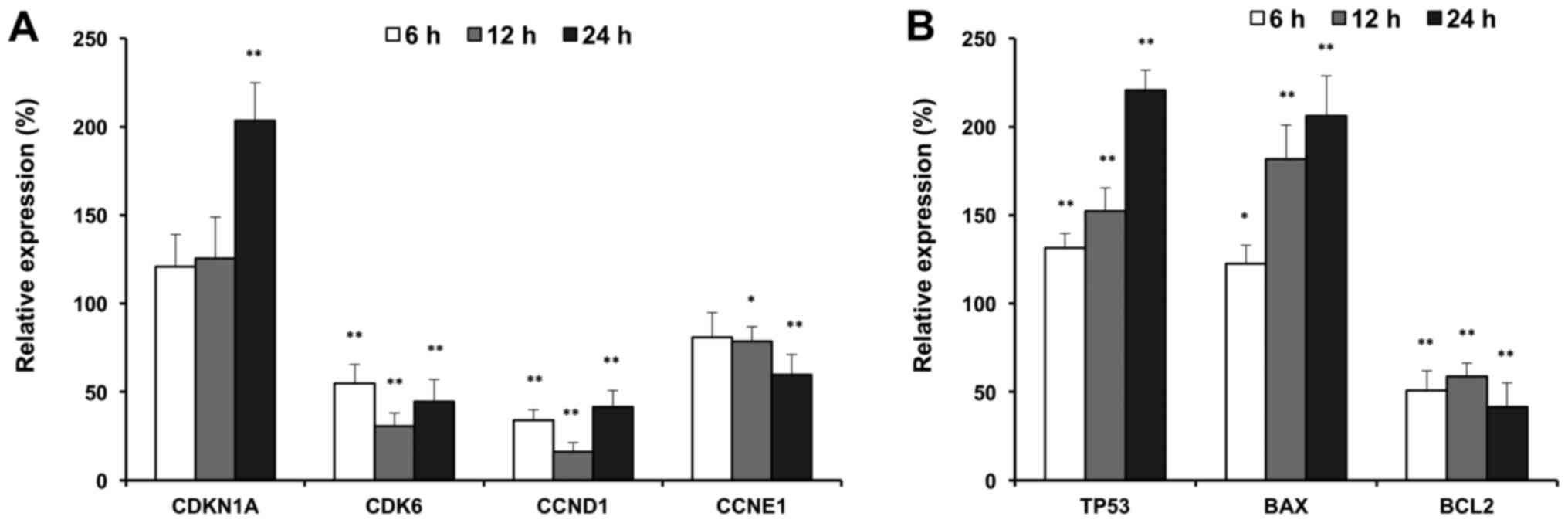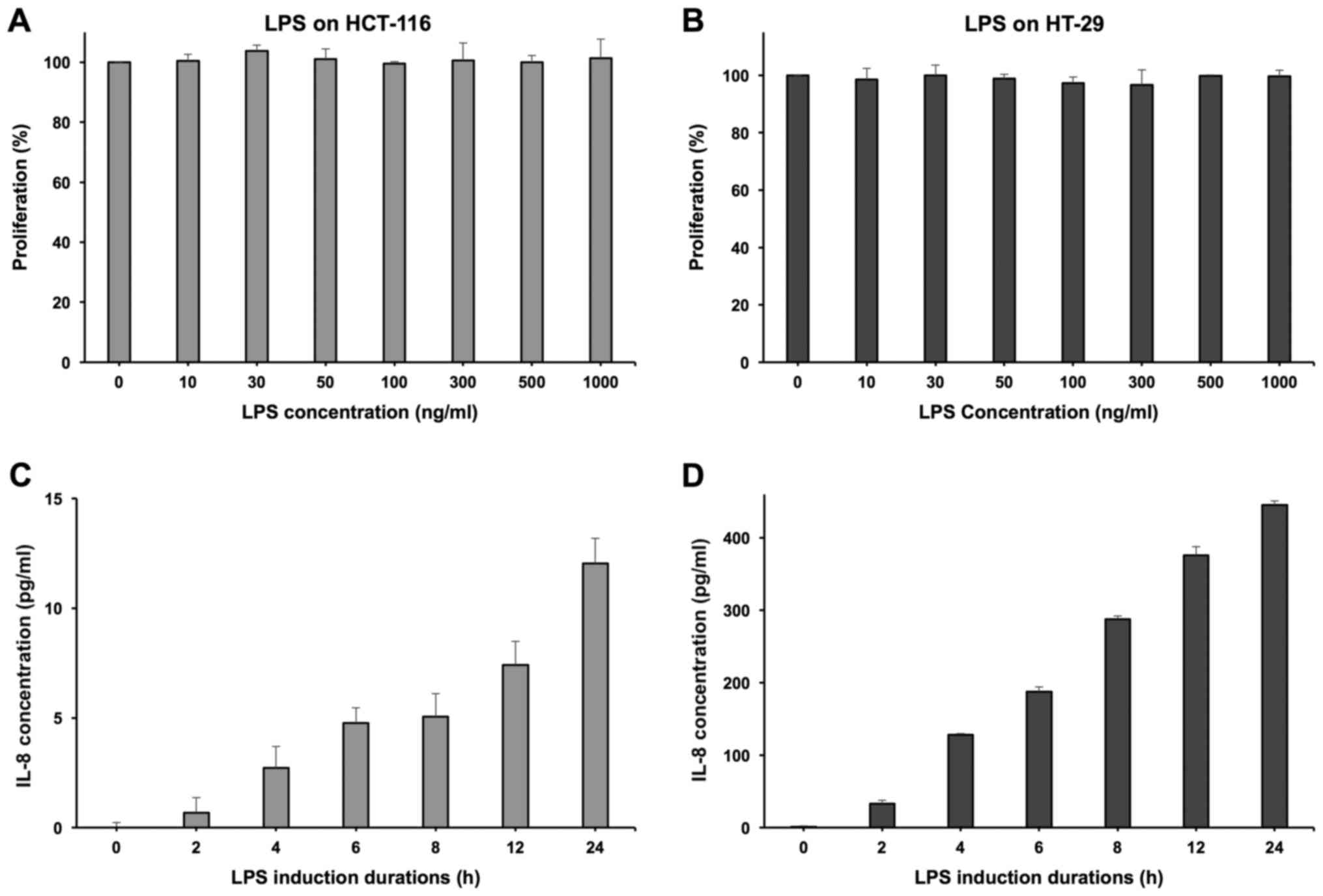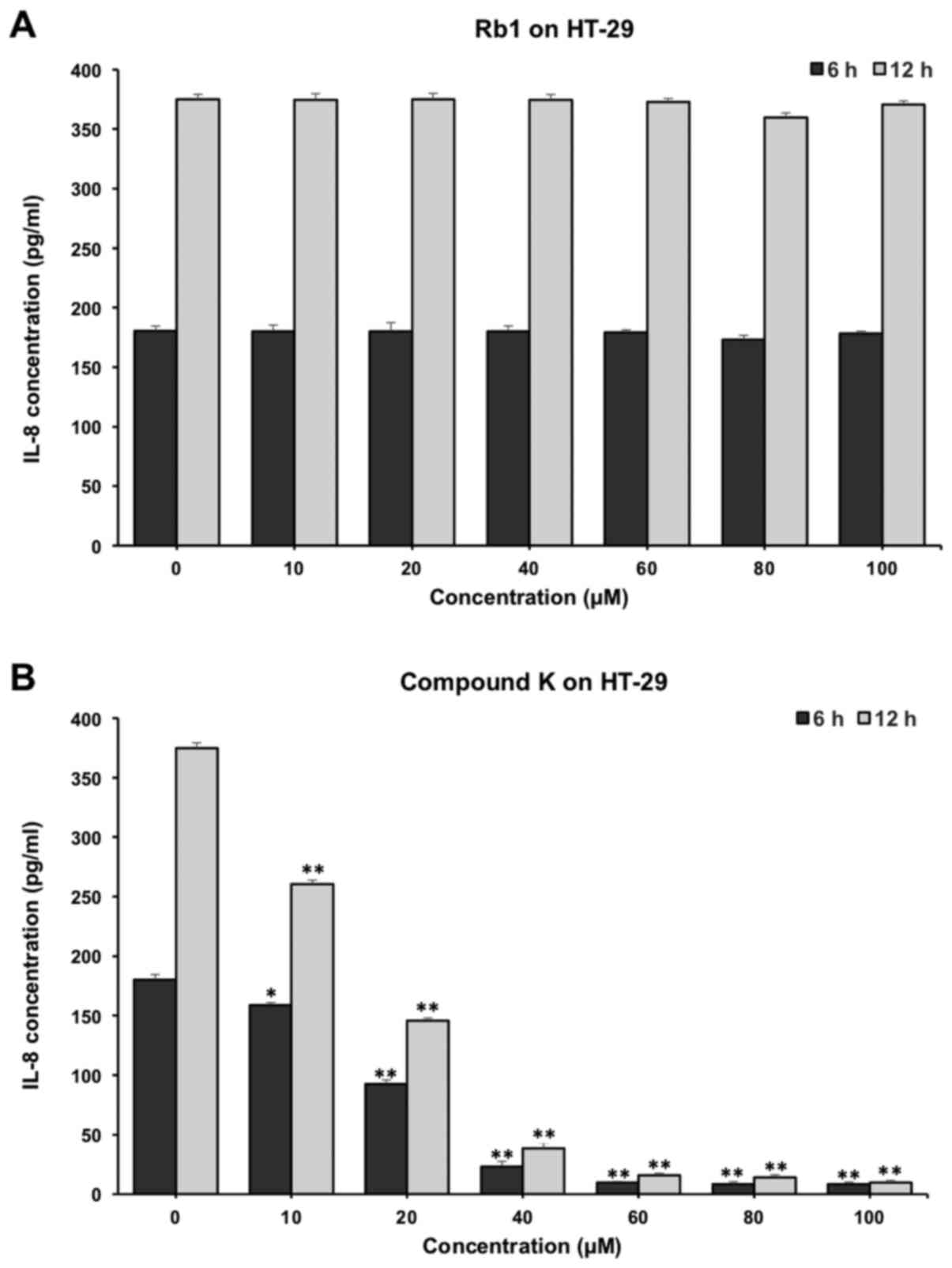|
1
|
Qi LW, Wang CZ and Yuan CS: Isolation and
analysis of ginseng: Advances and challenges. Nat Prod Rep.
28:467–495. 2011. View Article : Google Scholar : PubMed/NCBI
|
|
2
|
Kim DH: Chemical Diversity of Panax
ginseng, Panax quinquifolium, and Panax notoginseng. J
Ginseng Res. 36:1–15. 2012. View Article : Google Scholar : PubMed/NCBI
|
|
3
|
Park J, Bui PTC, Song H, Kim SK, Rhee DK,
Kim EY, Rhyu MR, Lee MS and Lee YJ: Ginseng on nuclear hormone
receptors. Am J Chin Med. 45:1147–1156. 2017. View Article : Google Scholar : PubMed/NCBI
|
|
4
|
Yennurajalingam S, Tannir NM, Williams JL,
Lu Z, Hess KR, Frisbee-Hume S, House HL, Lim ZD, Lim KH, Lopez G,
et al: A double-blind, randomized, placebo-controlled trial of
Panax ginseng for cancer-related fatigue in patients with
advanced cancer. J Natl Compr Canc Netw. 15:1111–1120. 2017.
View Article : Google Scholar : PubMed/NCBI
|
|
5
|
Wan JY, Huang WH, Zheng W, Park CW, Kim
SH, Seo DB, Shin KS, Zeng JX, Yao H, Sava-Segal C, et al: Multiple
effects of ginseng berry polysaccharides: Plasma cholesterol level
reduction and enteric neoplasm prevention. Am J Chin Med.
45:1293–1307. 2017. View Article : Google Scholar : PubMed/NCBI
|
|
6
|
Qi LW, Wang CZ and Yuan CS: Ginsenosides
from American ginseng: Chemical and pharmacological diversity.
Phytochemistry. 72:689–699. 2011. View Article : Google Scholar : PubMed/NCBI
|
|
7
|
Yuan CS, Wang CZ, Wicks SM and Qi LW:
Chemical and pharmacological studies of saponins with a focus on
American ginseng. J Ginseng Res. 34:160–167. 2010. View Article : Google Scholar : PubMed/NCBI
|
|
8
|
Lee SJ, Ha N, Kim Y and Kim MG: Changes in
the ginsenoside content during fermentation using an appliance for
the preparation of red ginseng. Am J Chin Med. 44:1595–1606. 2016.
View Article : Google Scholar : PubMed/NCBI
|
|
9
|
Du XH, Zhao YL, Yang DF, Liu Y, Fan K,
Liang ZS and Han RL: A correlation model of UPLC fingerprints and
anticoagulant activity for quality assessment of Panax
notoginseng by hierarchical clustering analysis and multiple
linear regression analysis. Anal Met. 7:2985–2992. 2015. View Article : Google Scholar
|
|
10
|
Wan JY, Liu P, Wang HY, Qi LW, Wang CZ, Li
P and Yuan CS: Biotransformation and metabolic profile of American
ginseng saponins with human intestinal microflora by liquid
chromatography quadrupole time-of-flight mass spectrometry. J
Chromatogr A. 1286:83–92. 2013. View Article : Google Scholar : PubMed/NCBI
|
|
11
|
Xiao J, Chen H, Kang D, Shao Y, Shen B, Li
X, Yin X, Zhu Z, Li H, Rao T, et al: Qualitatively and
quantitatively investigating the regulation of intestinal
microbiota on the metabolism of Panax notoginseng saponins.
J Ethnopharmacol. 194:324–336. 2016. View Article : Google Scholar : PubMed/NCBI
|
|
12
|
Hu Z, Yang J, Cheng C, Huang Y, Du F, Wang
F, Niu W, Xu F, Jiang R, Gao X and Li C: Combinatorial metabolism
notably affects human systemic exposure to ginsenosides from orally
administered extract of Panax notoginseng roots (Sanqi).
Drug Metab Dispos. 41:1457–1469. 2013. View Article : Google Scholar : PubMed/NCBI
|
|
13
|
Wan JY, Wang CZ, Liu Z, Zhang QH, Musch
MW, Bissonnette M, Chang EB, Li P, Qi LW and Yuan CS: Determination
of American ginseng saponins and their metabolites in human plasma,
urine and feces samples by liquid chromatography coupled with
quadrupole time-of-flight mass spectrometry. J Chromatogr B Analyt
Technol Biomed Life Sci. 1015–1016:62–73. 2016. View Article : Google Scholar
|
|
14
|
Wang CZ, Kim KE, Du GJ, Qi LW, Wen XD, Li
P, Bauer BA, Bissonnette MB, Musch MW, Chang EB and Yuan CS:
Ultra-performance liquid chromatography and time-of-flight mass
spectrometry analysis of ginsenoside metabolites in human plasma.
Am J Chin Med. 39:1161–1171. 2011. View Article : Google Scholar : PubMed/NCBI
|
|
15
|
Wang CZ, Du GJ, Zhang Z, Wen XD, Calway T,
Zhen Z, Musch MW, Bissonnette M, Chang EB and Yuan CS: Ginsenoside
compound K, not Rb1, possesses potential chemopreventive activities
in human colorectal cancer. Int J Oncol. 40:1970–1976.
2012.PubMed/NCBI
|
|
16
|
Grimoud J, Durand H, de Souza S, Monsan P,
Ouarné F, Theodorou V and Rogues C: In vitro screening of
probiotics and synbiotics according to anti-inflammatory and
anti-proliferative effects. Int J Food Microbiol. 144:42–50. 2010.
View Article : Google Scholar : PubMed/NCBI
|
|
17
|
Ferlay J, Soerjomataram I, Dikshit R, Eser
S, Mathers C, Rebelo M, Parkin DM, Forman D and Bray F: Cancer
incidence and mortality worldwide: Sources, methods and major
patterns in GLOBOCAN 2012. Int J Cancer. 136:E359–E386. 2015.
View Article : Google Scholar : PubMed/NCBI
|
|
18
|
Troeung L, Sodhi-Berry N, Martini A,
Malacova E, Ee H, O'Leary P, Lansdorp-Vogelaar I and Preen DB:
Increasing incidence of colorectal cancer in adolescents and young
adults aged 15–39 years in Western Australia 1982–2007: Examination
of colonoscopy history. Front Public Health. 5:1792017. View Article : Google Scholar : PubMed/NCBI
|
|
19
|
Campos FGCM, Figueiredo MN, Monteiro M,
Nahas SC and Cecconello I: Incidence of colorectal cancer in young
patients. Rev Col Bras Cir. 44:208–215. 2017.(In English,
Portuguese). View Article : Google Scholar : PubMed/NCBI
|
|
20
|
Ullman TA and Itzkowitz SH: Prognosis of
colorectal cancer in inflammatory bowel disease: Data from a state
registry. Dig Dis Sci. 62:1850–1851. 2017. View Article : Google Scholar : PubMed/NCBI
|
|
21
|
Ehrlich AC, Patel S, Meillier A, Rothstein
RD and Friedenberg FK: Chemoprevention of colorectal cancer in
inflammatory bowel disease. Expert Rev Anticancer Ther. 17:247–255.
2017. View Article : Google Scholar : PubMed/NCBI
|
|
22
|
Brennan CA and Garrett WS: Gut microbiota,
inflammation, and colorectal cancer. Annu Rev Microbiol.
70:395–411. 2016. View Article : Google Scholar : PubMed/NCBI
|
|
23
|
Wang CZ, Huang WH, Zhang CF, Wan JY, Wang
Y, Yu C, Williams S, He TC, Du W, Musch MW, et al: Role of
intestinal microbiome in American ginseng-mediated colon cancer
protection in high fat diet-fed AOM/DSS mice. Clin Transl Oncol.
20:302–312. 2018. View Article : Google Scholar : PubMed/NCBI
|
|
24
|
Dai D, Zhang CF, Williams S, Yuan CS and
Wang CZ: Ginseng on cancer: Potential role in modulating
inflammation-mediated angiogenesis. Am J Chin Med. 45:13–22. 2017.
View Article : Google Scholar : PubMed/NCBI
|
|
25
|
Kim HS, Kim MK, Lee M, Kwon BS, Suh DH and
Song YS: Effect of red ginseng on genotoxicity and health-related
quality of life after adjuvant chemotherapy in patients with
epithelial ovarian cancer: A randomized, double blind,
placebo-controlled trial. Nutrients. 9:pii: E772. 2017. View Article : Google Scholar
|
|
26
|
Yu T, Rhee MH, Lee J, Kim SH, Yang Y, Kim
HG, Kim Y, Kim C, Kwak YS, Kim JH and Cho JY: Ginsenoside Rc from
Korean red ginseng (Panax ginseng C.A. Meyer) attenuates
inflammatory symptoms of gastritis, hepatitis and arthritis. Am J
Chin Med. 44:595–615. 2016. View Article : Google Scholar : PubMed/NCBI
|
|
27
|
Poudyal D, Le PM, Davis T, Hofseth AB,
Chumanevich A, Chumanevich AA, Wargovich MJ, Nagarkatti M,
Nagarkatti PS, Windust A and Hofseth LJ: A hexane fraction of
American ginseng suppresses mouse colitis and associated colon
cancer: Anti-inflammatory and proapoptotic mechanisms. Cancer Prev
Res (Phila). 5:685–696. 2012. View Article : Google Scholar : PubMed/NCBI
|
|
28
|
Tawab MA, Bahr U, Karas M, Wurglics M and
Schubert-Zsilavecz M: Degradation of ginsenosides in humans after
oral administration. Drug Metab Dispos. 31:1065–1071. 2003.
View Article : Google Scholar : PubMed/NCBI
|
|
29
|
Kim KA, Jung IH, Park SH, Ahn YT, Huh CS
and Kim DH: Comparative analysis of the gut microbiota in people
with different levels of ginsenoside Rb1 degradation to compound K.
PLoS One. 8:e624092013. View Article : Google Scholar : PubMed/NCBI
|
|
30
|
Xiao J, Chen D, Lin XX, Peng SF, Xiao MF,
Huang WH, Wang YC, Peng JB, Zhang W, Ouyang DS and Chen Y:
Screening of drug metabolizing enzymes for the ginsenoside compound
K in vitro: An efficient anti-cancer substance originating from
Panax ginseng. PLoS One. 11:e01471832016. View Article : Google Scholar : PubMed/NCBI
|
|
31
|
Chen Y, Xu Y, Zhu Y and Li X: Anti-cancer
effects of ginsenoside compound K on pediatric acute myeloid
leukemia cells. Cancer Cell Int. 13:242013. View Article : Google Scholar : PubMed/NCBI
|















